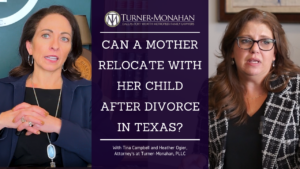Divorce brings many changes, not just for parents but also for their children. When legal agreements come into play, decision-making responsibilities can shift in unexpected ways. Understanding these changes is crucial for navigating life after divorce.
In the video, Atty. Tina Campbell of Turner-Monahan PLLC discusses how divorce impacts a mother’s ability to make critical decisions for her children, covering topics like educational choices, medical decisions, and religious upbringing and emphasizing the importance of collaboration in co-parenting. All case evaluations are based on Texas Family Law. This content is for educational purposes only.
How Divorce Affects Parenting and Upbringing
Divorce significantly impacts a mother’s ability to shape the upbringing she envisions for her children, including their education and overall development. When parents divorce, the rights and duties concerning their children are divided between them, often outlined in the final decree of divorce.
For instance, if a mother is granted the exclusive right to make educational decisions, she can independently choose between public, private, or homeschooling. However, if the right is shared, decisions require the agreement of both parents. If the father has this right, the mother may need to adhere to his choices regarding the children’s education.
Key Decisions Allocated During Divorce
The final decree of divorce usually addresses three critical areas of decision-making for children, often referred to as “the big three”:
- Invasive Medical Decisions: Who decides on surgeries or significant medical interventions?
- Psychiatric and Psychological Treatments: Who determines the mental health care approach for the child?
- Educational Decisions: Who selects the child’s schooling options?
These decisions are allocated specifically to ensure clarity moving forward. Religious upbringing is an additional consideration, but it functions differently. Each parent has the right to teach the child their chosen religion during their custodial time. For example, if a mother wants to take her child to a Catholic church on her weekend, she has that right. Similarly, the father can take the child to a Baptist church during his time.
This setup reflects an aspect of parenting that often remains unchanged, even in intact households—parents must still communicate and collaborate on major decisions.
Collaboration Despite Exclusive Rights
Even when a mother is granted exclusive decision-making authority, it’s essential to foster a co-parenting relationship. Open communication with the other parent can promote collaboration and mutual respect, even if their input isn’t binding. While the court order might allow exclusive decision-making, maintaining a dialogue with the other parent demonstrates consideration and fairness.
This perspective is important because, if roles were reversed, a mother would likely appreciate being included in these significant decisions. Respecting this balance can also contribute to a healthier co-parenting dynamic, ultimately benefiting the child.
Emotional Impact of Divorce on Parental Decision-Making
Divorce doesn’t just redistribute rights and responsibilities; it also brings emotional challenges that can influence decision-making. Parents may experience stress, grief, or guilt, which can cloud judgment or create tension during discussions about their children.
Recognizing these emotions and seeking support through counseling or therapy can help parents approach decisions more objectively and collaboratively, ensuring the child’s needs remain the priority.
Financial Considerations and Their Role in Decision-Making
Another critical factor is how financial changes post-divorce affect parenting decisions. Child support and spousal maintenance might help alleviate some financial strain, but budgeting for education, healthcare, and extracurricular activities often requires recalibration. Parents need to plan for these expenses carefully and discuss shared contributions to avoid disputes and ensure their child’s well-being.
What Does the Texas Family Code Say?
The Texas Family Code governs many aspects of divorce and parenting, providing a framework for how parental rights and responsibilities are divided. Below are some key statutes relevant to this topic:
Section 153.001 – Public Policy
This section emphasizes the importance of encouraging frequent and continuing contact between children and parents who can act in the child’s best interest. It also highlights the need for parents to share rights and duties unless it would harm the child. This principle underscores the value of collaboration, even in cases where one parent has exclusive decision-making authority.
Section 153.134 – Joint Managing Conservatorship
Under this statute, the court outlines the rights and duties of parents who are appointed joint managing conservators. This often includes shared decision-making on significant matters such as education and medical care. However, the court may grant one parent exclusive rights in specific areas if deemed necessary for the child’s welfare.
Section 153.073 – Rights of Parents
This section specifies the basic rights each parent has, including the right to receive information about the child’s health, education, and welfare. It also highlights the right to attend school activities and consult with educators or healthcare providers, ensuring both parents remain involved in the child’s life.
Section 153.074 – Rights and Duties During Possession
When a parent has physical custody of a child, they have the right to make decisions concerning the child’s care. This includes everyday choices like meals, routines, and religious practices during their custodial time. This statute emphasizes that day-to-day parenting responsibilities are still significant, even if the other parent holds decision-making authority over major issues.
Speak with a family law attorney to explore how these statutes apply to your case and to receive tailored advice for your situation.
Hire An Experienced Fort Worth, Texas, Divorce Attorney
Divorce involves complex adjustments, especially when it comes to parenting decisions. Parents should stay informed about their rights and responsibilities to ensure they can act in their child’s best interest.
For personalized guidance, consult with an experienced family law attorney who can help navigate these challenges and protect your family’s future. Schedule a free, no-obligation consultation with attorney Tyler Monahan to discuss the details.
Check our website for more information about our services. Plus, don’t forget to go through our blog to find out more regarding your case. There is tons of information on divorce and answers to unique questions like “How is Child Support Determined in Texas.”
FAQs Regarding Divorce
Divorce cases are unique, so you will have many questions. To save you time and hassle, here are some topics that revolve around the area. For more information, contact our firm, Turner-Monahan, PLLC.
- What Are Divorce Decree Modifications?
- Do I Need a Postnuptial Agreement?
- Can I Change My Child’s Last Name After Divorce?
- 18 Divorce Do’s and Don’ts
Disclaimer
The commentary and opinions are for informational and educational purposes only and not to provide legal advice. You should contact an attorney in your state for legal advice concerning any particular issue or problem. You can become a client and enter the attorney-client privilege only after hiring Turner-Monahan, PPLC, by signing a written retainer agreement.


